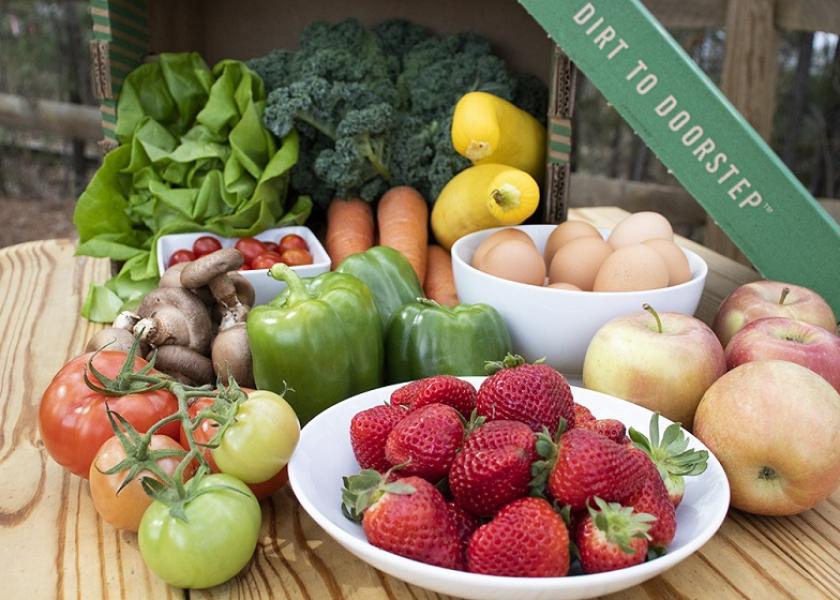Seasonal Roots promotes ‘dirt to doorstep’ online farmers market in Mid-Atlantic

Richmond, Va.-based Seasonal Roots is filling a niche as a “dirt to doorstep” online farmers market serving Mid-Atlantic shoppers, said Duane Slyder, founder.
Seasonal Roots began in 2011, connecting consumers in Virginia and Maryland with local produce farmers and artisans.
“(Seasonal Roots) really started to support local farmers,” Slyder said. Seasonal Roots aims to provide quality and nutritious foods to consumers that are hyperlocal and seasonal.
Each week, produce, eggs, artisan foods and other items are delivered to the homes of customers. Members choose from nearly 200 seasonal items including fruits, vegetables, dairy products, meats and seafood, as well as artisan and prepared foods, breads and cookies, coffee, yogurt, dips, spreads, and more, according to the company’s website.
“This is our 11th year, and it is a good solid business model,” he said. Seasonal Roots is business to consumer, only delivering to customers’ homes.
With purchase of a membership, consumers customize their weekly home-delivered orders year-round, selecting items from a range of what’s fresh and seasonal that week.
“All of our consumers cook,” he said. “And they want the best ingredients.”
For example, local green beans boast incredible flavor that he said is unmatched at any grocery store.
“When (consumers) find out what we have, they stay,” he said.
Seasonal Roots currently delivers to regions of Virginia including Fredericksburg, Greater Richmond, Hampton Roads, Northern Virginia, Williamsburg, and also nearby Montgomery County, Maryland, according to the Seasonal Roots website. Boxes, available in three sizes, are delivered to consumers’ homes (or offices) each week by Seasonal Roots Market Managers who live in the communities they serve.
The escalation in fuel prices has resulted in the introduction of a delivery fee about four months ago, Slyder said.
“We absorbed it as long as we could,” he said.
Seasonal Roots works with about 90 growers, Slyder said, with about a dozen growers that are key suppliers.
“We still have farmers that we were using on day one (in 2011) that we are still using,” he said.
The company hears from growers about what crops are coming into season.
Seasonal Roots informs growers of expected demand, and orders are typically placed over the weekend for the following week’s deliveries. This was one of the first companies to enter the online local food market in the mid-Atlantic region and has its own proprietary software technology, he said.
“We created software that really fits our model,” Slyder said. “We didn’t create a model that fits software.”
For its online farmers’ market, Seasonal Roots offers about 120 stock keeping units, and many of the items are seasonal.
Hub system
Seasonal Roots operates a food hub system to deliver food to consumers.
Seasonal Roots now customizes every order based on customer preference, he said. The company operates an “assembly line” systems in a refrigerated room. From there, completed boxes are delivered to specific locations, where drivers deliver the boxes to Seasonal Roots customers.
Some online food services only have average membership duration of just six weeks, but Slyder said that Seasonal Roots has customers for an average 18 months. During the early days of the COVID-19 pandemic, the company said a huge spike in demand. “We grew 140% in 2020 and we have been able to hang on to most of that,” Slyder said.
While the Seasonal Roots model could be transferrable to other regions of the country, Slyder said the company is solely focused on refining its model and increasing customer loyalty.
Since its inception, Seasonal Roots has developed into a year-round online market.
“When we first started, I did think we were going to have an offseason, say from November to April,” he said. In fact, items such as kale, root veggies and winter carrots have strong demand through the winter.
Seasonal Roots attempts to source produce and other food within 150 miles of where they are delivering.
“We’re constantly as hyperlocal as we can be,” he said, though he said Seasonal Roots does expands it sourcing in the winter to offer items like citrus from Florida.
Seasonal Roots isn’t trying to be price competitive with massive retailers like Walmart, Slyder said.
Its “defendable niche” is an online farmers market with hyperlocal sourcing.
“We are very focused on our corporate culture,” he said. ‘Our mission is to unite people with local farmers, so we can all eat, live and love better.”







